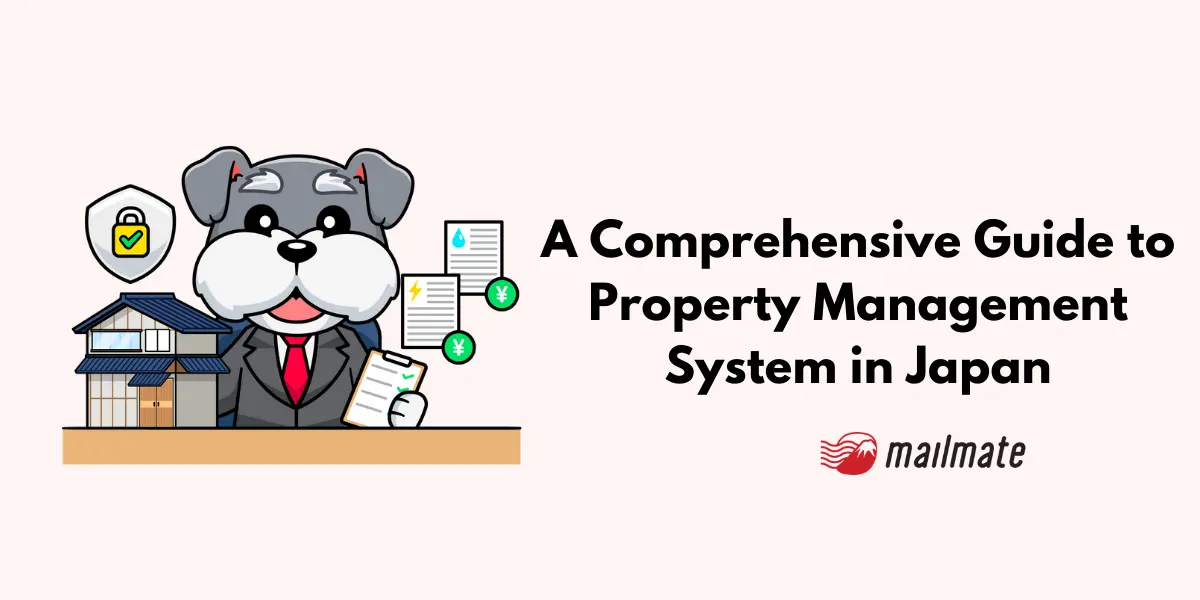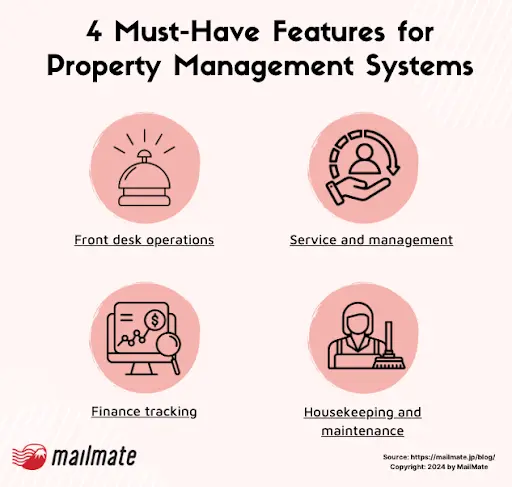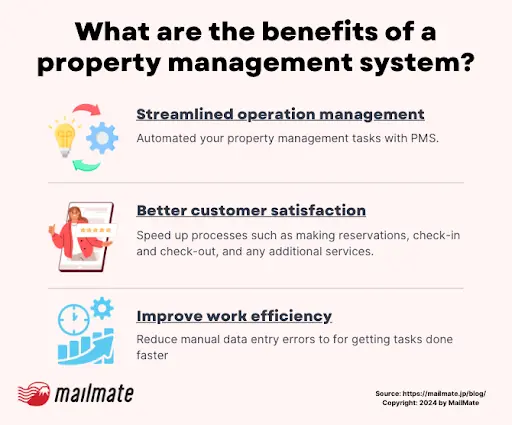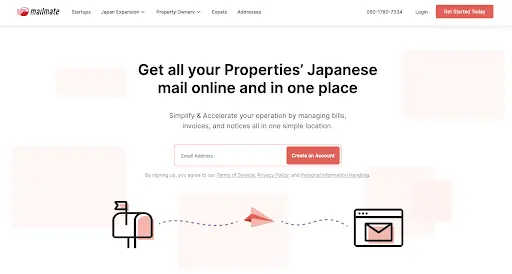Property Management Systems in Japan: A Comprehensive Guide

Property management systems, or PMSs, are vital in the hospitality industry.
This guide explores what PMS is, its features, benefits, and how to choose one for your minpaku, minshuku, or Airbnb property in Japan.
What is a property management system?
A property management system is a software platform that a wide range of establishments, including hotels, inns, and Airbnbs, utilize to manage tasks and enhance customer service.
Many property management systems can handle various actions, including but not limited to room reservations, guest check-in and check-out processes, room availability management, billing, and customer service.
Essential property management features for Japanese properties

When evaluating PMS options for your Japanese property, certain features have proven indispensable for smooth operations, room management, and guest satisfaction. These core capabilities form the foundation of any effective property management strategy.
1. Front desk operations
An online property management system with front desk operation features combines managing reservations with front desk tasks to streamline the booking process (whether direct bookings or online bookings) and room tracking status.
Today's travelers expect efficiency and convenience throughout their stay experience.
Robust front desk management combines reservation management with guest services to create seamless experiences from booking to departure.
Modern front desk features include automated online check-in and check-out processes, QR code-based self-service options, and real-time room status tracking.
Many Japanese properties have found particular success with contactless solutions to check guests in and out and bypass traditional front desk interactions while still maintaining high service standards. The system should also support multiple languages, essential for serving Japan's diverse international visitor base.
For example, many travelers use self-service check-ins with QR codes or automatic check-outs instead of interacting with a front desk or filling out paperwork.
2. Advanced service and guest management
This feature includes customer service, facility management, maintaining guests' profiles, and managing your venues to ensure everything runs smoothly without scheduling conflicts.
Exceptional hospitality requires understanding and anticipating guest needs. Comprehensive service management features help properties deliver personalized experiences while maintaining operational efficiency across multiple areas of guest interaction.
This includes detailed guest profile management that tracks preferences, special requests, and stay histories.
The system should facilitate smooth coordination between departments, from housekeeping to concierge services, ensuring that guest requests are handled promptly and nothing falls through the cracks. For properties managing multiple locations, centralized guest data becomes particularly valuable for providing consistent service across all touchpoints.
3. Integrated financial management
A great property management system software helps with financial operations, from point-of-sale transactions for comprehensive accounting to automatic account verification for accurate and up-to-date data.
Key financial features include automated billing and invoicing, integration with Japanese accounting standards, and real-time revenue reporting.
The system should handle complex pricing structures, including seasonal rates and group discounts, while providing detailed analytics on revenue performance, occupancy trends, and profit margins. This data proves invaluable for strategic decision-making and identifying opportunities for revenue optimization and management.
4. Intelligent housekeeping and maintenance coordination
Housekeeping and maintenance are crucial to keep your property clean and well-managed. A property management system can help schedule and oversee cleanings of facilities and larger spaces.
Effective PMS solutions streamline these critical operational elements to ensure guest-ready spaces and prevent maintenance issues from impacting the guest experience.
Advanced housekeeping features include automated room status updates, maintenance request tracking, and integrated scheduling that accounts for checkout times, cleaning requirements, and maintenance needs.
Hotel property management systems should provide real-time visibility into room readiness, allowing front desk staff to make informed decisions about room assignments and guest accommodations.
For example, with certain property management systems, the cleaning management feature lets you schedule and track cleaning so rooms are ready for new guests.
What are the benefits of a property management system?

Understanding the tangible benefits of a well-chosen cloud-based software for your hotel operations helps justify the investment and sets realistic expectations for implementation outcomes. Properties across Japan have reported significant improvements in multiple operational areas following strategic hotel property management systems adoption.
1. Streamlined operation management
Property management systems are third-party solutions designed to significantly reduce the time your staff would spend on back office operations, freeing them up to focus on other important aspects of their work, such as the overall guest experience. This efficiency can bring a sense of relief, knowing that a cloud-based hotel PMS is handling the tedious tasks.
2. Better customer satisfaction
On-premises software, such as property management systems, has benefits not just for property managers. They also benefit your guests by speeding up processes such as making reservations, check-ins and check-outs, and additional services. This can instill confidence in your service quality, knowing that your guests' needs are being met efficiently.
3. Improved work efficiency
Online property management systems help reduce manual data entry errors, improving financial reporting, analytics, revenue management, and payment processing. As well as reducing repetitive tasks and streamlining office operations and trhgouh a central reservation system. These routine operations with PMS allow faster service and task completion.
How to choose a property management system
The Japanese hospitality market and hotel industry include diverse property types, each with unique operational requirements and guest expectations. Selecting the right PMS requires understanding these differences and matching system capabilities to your specific needs for third-party integrations and growth plans.
Property Type |
Essential Features |
Monthly Cost Range |
Implementation Time |
Small and Medium Properties |
Intuitive reservation management, straightforward billing processes, basic reporting capabilities, mobile access, cloud-based solutions |
¥5,000 to ¥20,000 |
2-4 weeks |
Business Hotels |
Corporate rate management, advanced CRM features, group booking management, detailed billing for expenses, loyalty program integration, and meeting room booking integration |
¥30,000 to ¥80,000 |
4-8 weeks |
Large Hotels and Resorts |
Multi-property management, advanced revenue optimization, spa and restaurant integration, event and banquet management, multiple user roles and permissions, extensive customization options |
Contact for pricing |
3-6 months |
We go into further detail below:
1. For small and medium-sized facilities
Whether you run an inn, guesthouse, small hotel, hostel, or Airbnb, an easy-to-use and cost-effective property management system software is designed to streamline your daily operations without any complexities.
This adaptability can provide a reassuringly simple solution for your property management needs, regardless of your establishment type.
Basic features such as reservation management and a simplified account are sufficient to keep things running.

If you're already using a PMS, add MailMate to your lineup to streamline your Japanese postal mail and translate its content into English.

The service offers centralized mail collection and management across multiple properties, eliminating the need for physical mail collection and distribution.

Automated workflow features allow you to create rules for sorting, forwarding, and storing important documents with minimal manual intervention.
Perhaps most valuable for international property operators, MailMate provides bilingual support for understanding Japanese government notices, utility correspondence, and other critical communications that impact your business operations.
2. For business hotels
Business hotels need features supporting repeat customers, managing corporate clients, and supporting their partnerships.
Business hotels in Japan can use two main options for their property management systems. Aipass (アイパス) helps make reservations for repeated guests, those with long-term consecutive stays, and even large group reservations based on their customers' past preferences and frequency of past stays.
There's also ビズサイト・ナフェイス CLOUD (BizSite N@FACE CLOUD), where you can use their services to adjust the room's rate based on the type and time of day, and adjust for demand and supply.
3. For larger-scale facilities
Larger hotel operations, commercial properties, and resorts with over 100 rooms need a robust property management system to handle complex operations such as managing staff, multiple guests' room details, and coordinating large-scale events.
Youcom's Hotel Manager Series is a highly customizable property management system software that integrates with all aspects of your operations. For properties that focus on managing events and banquets, then 宿OH!Pro is for you.
Finally, for hotels specializing in weddings and department banquets, GLOVIA smart ホテル can handle reservations, estimations, and payment management.
Frequently asked questions
What is the difference between PMS and HMS?
PMS stands for property management system, while HMS stands for hotel management system. They are related but not identified, as both systems help manage and streamline their properties. Both systems help streamline the process of managing properties.
How long does PMS implementation typically take?
Implementation timelines vary significantly based on property size and complexity. Small properties can often complete basic implementations within 2-4 weeks, while large hotels may require 3-6 months for full deployment, including staff training and system optimization. The key is realistic timeline planning and adequate staff preparation.
What should I expect to pay for PMS in Japan?
Pricing varies widely based on property size and feature requirements. Small properties typically pay ¥5,000-20,000 monthly, business hotels range from ¥30,000-80,000 monthly, and enterprise solutions can exceed ¥100,000 monthly. Consider the total cost of ownership, including implementation, training, and ongoing support when evaluating options.
How do I ensure data security and compliance with Japanese regulations?
Choose PMS providers that specifically support Japanese data protection requirements and maintain local data storage options. Ensure the system provides detailed audit trails, secure guest data handling, and integration with Japanese accounting and tax reporting requirements. Regular security audits and staff training on data handling procedures are also essential.
In closing
Property management systems, especially in Japan, promote DX for hotels, hostels, inns, and Airbnb accommodations. Leveraging PMS technologies maximizes time and cost efficiency for your property.
Managing correspondence across multiple properties presents unique challenges in Japan's document-heavy business environment.
MailMate provides centralized mail management that integrates seamlessly with your existing PMS workflows to ensure important communications never get overlooked.
Spending too long figuring out your Japanese mail?
Virtual mail + translation services start at 3800 per month. 30-day money-back guarantee.

